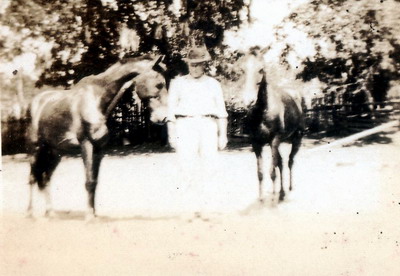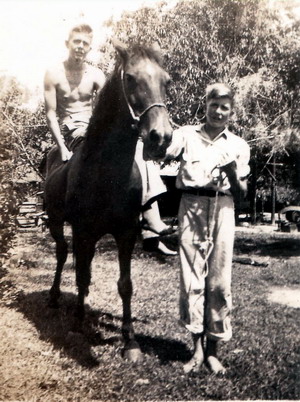LOG ROLLINGS
 Wilbur with Knot and Cabbage
Wilbur with Knot and CabbageWhen we cleared our land we gave “log
rollings.” We invited the folks over and had a regular picnic. The men
worked rolling the logs in piles to burn and the women visited. We had
two horses and a wagon. Wilbur traded a cabbage patch for a young horse
about three years old and broke him to the wagon and plow. We called
him “Cabbage.” The horse his father gave him was called “Knot.” Knot
was a born cow pony. He could cut a cow from a bunch of cows, just turn
his head to the one you wanted and he’d get him. He never would go too
close to a tree or limb as he was looking out for the rider too.
 Morris
on Cabbage & Arnold
Morris
on Cabbage & ArnoldOur land looked different from hammock land and Mr. Mixson thought we’d starve there. In the fall we had a barn full of corn and two stacks of hay and a good peanut patch to fatten the hogs. We usually butchered seven or eight hogs for our meat and lard. We needed four cans of lard to last until the next fall. We always had all the sirup we needed and sweet potatoes too. The sweet potatoes were dug before frost and put in piles (like an Indian tepee) then covered with a thick covering of pine straw, then long strips of (at that time) of pine bark. Later we used boards, then covered all with dirt, leaving a door that we could get the potatoes when we needed them to cook. They would keep until late the next spring.
Roslie’s Diary
July 30, 1991
In the counties south of us (Marion co) the grasshoppers are eating up everything. At first they couldn't get anything to kill them but at last they have found a way to slow them down. Also horses are have Encephalites. The number is now 175 horses. Humans can get it too, it is caused by misquitoes. I remember when our horse took it and died. We had been giving him the shots ever year but that year one of the boys said "Dad old Cabbage is follering one of the cows around and around" so they took the bridle and brought him to the house and put him in the horse lot, there he went around in circles until he dropped dead. That was our last horse. After that we had a mule for a while at least I can't remember what happened after that.
I usually had about 30 hens and a rooster or two. We had young fryers
almost all the time when we needed them. Some eggs to eat but most were
sold for tobacco (for Wilbur) rice, sugar, coffee, soda, baking powder.
I made all the soap for washing clothes. First I would heat the water
in the iron wash pot, then rubbed the clothes on the washboard with
plenty of lye soap. The direst ones were beat with a flat stick that
I used to punch the clothes down in the pot while boiling. It would
take all day to wash. Then I ironed. I got oak wood for the fire to
heat the irons. I loved to iron--the fresh ironed clothing smelled so
good. We used the fire place to heat the irons. The way I made the irons
smooth was to rub beeswax on them and they would just glide over the
clothes.
We tried to have enough hogs for our meat and a few to sell in the fall.
I would raise fryers to sell in the spring and fall. Wilbur thought
it was a waste of corn to feed chickens, he said, “Pa never fed any
chickens.” They always had four or five horses, saddle horses and plow
horses, and a lot of hogs to feed. All the stock ran in the woods those
days and people only had their fields fenced.
Sometimes we would have a beef club. There would be six or eight families
and each family would butcher a beef and divide it into six or eight
parts-and when that number of beef, 6 or 8, had been butchered every
family had a whole beef. We didn’t have a refrigerator those days and
I took our share of beef and salted it down in a two gallon or larger
stone jar--putting a layer of salt and a layer of meat until the jar
was full. It would keep good, but when we were ready to cook any, I
would soak it over night to get the salt out. We always had enough to
last until the next week, when we got another piece of fresh beef.
The first years on our farm, Wilbur trapped possoms, coons, and skunks.
He put out the traps sometimes a few days before, then when he had them
all set and baited he would get up early and feed the horses and go
to the traps. He would bring back two or three coons or possoms. I did
most of the skinning and stretching the hides. Then after he had his
breakfast, he would go to work plowing the land. We worked hard but
never made any money. I made all my clothes and the children’s. Also
Wilbur’s shirts. We cut their hair. Each boy had three shirts and three
pair of pants for school, when they were old enough to go.
When we went to the mill at Fairfield, we hitched up both horses to
the wagon, the horses, Cabbage and Knot. (Knot a real cowpony and Cabbage
part race horse and “wild” mare.) I would put quilts and pillows in
the back of the wagon for the children to sleep on when coming back
late at night. We would have two pecks of meal ground and one of course
ground for grits.
In the late spring we pulled “fodder” (corn leaves). Pulling an arm
full and hanging it on the ear of corn until dry, then gathering it
unto a bundle, wrapping a few leaves around the bundle , then taking
it to the barn before a rain. The corn leaves were stripped off while
green and the corn ears almost dry for fodder. We all helped get in
the fodder and sometimes it was a race to get it in before the rain
came. It was hot work, the sun would burn your feet, blister your face
and the fodder would make you itch all over. It seemed important then
to have plenty of fodder for the horses.
String beans were planted for our money crop--planting only two or three
pecks of black valentine beans, just what he and the boys could pick.
The beans made so good that most always we had to have help to pick
them. At that time it seemed to me I was going to have a baby or had
a small one, that I wasn’t much help those years.
I made all our soap with lye from left over grease or “craklins”; (what
meat was left after cooking out the lard). I could make good soap. I
cooked it in the iron wash pot. When done it was left over night in
the pot and the next morning cut in large pieces and layed on a board
to dry. It was used for washing clothes and washing dishes. Octagan
soap was used to take baths and washing your face and hands. (Papa used
Sweetheart soap to shave with.)
Everyone bought green coffee and toasted just the right color of brown
and ground each meal on the coffee mill that hung on the wall. There
was always plenty of turnips and mustard greens, spring and fall also
sweet potatoes and sirup. We also planted sugar cane for our sirup.
We planted “green soft” sugar cane. Papa had a vat to cook the cane
juice in. Also a mill to extract the juice from the cane. A barrel with
a clean cloth tied over it to strain the juice as it came from the mill.
The two horses pulled the mill, going round and all day, only stopping
for dinner. The juice tasted cool and good and the sirup cooking smelled
delicious. I would feed the can mill (the stalks of cane were put thru
a three roller mill) to get the juice, until the vat was full and the
juice was cooking then I took over skimming the juice as it cooked,
the better it was skimmed the brighter the sirup. I got to be pretty
good--when the sirup was done it was poured into a tub setting on the
front of the furnace, then poured into bottles, jugs or tin gallon cans.
The bottles and jugs were sealed with beeswax or rosin.

